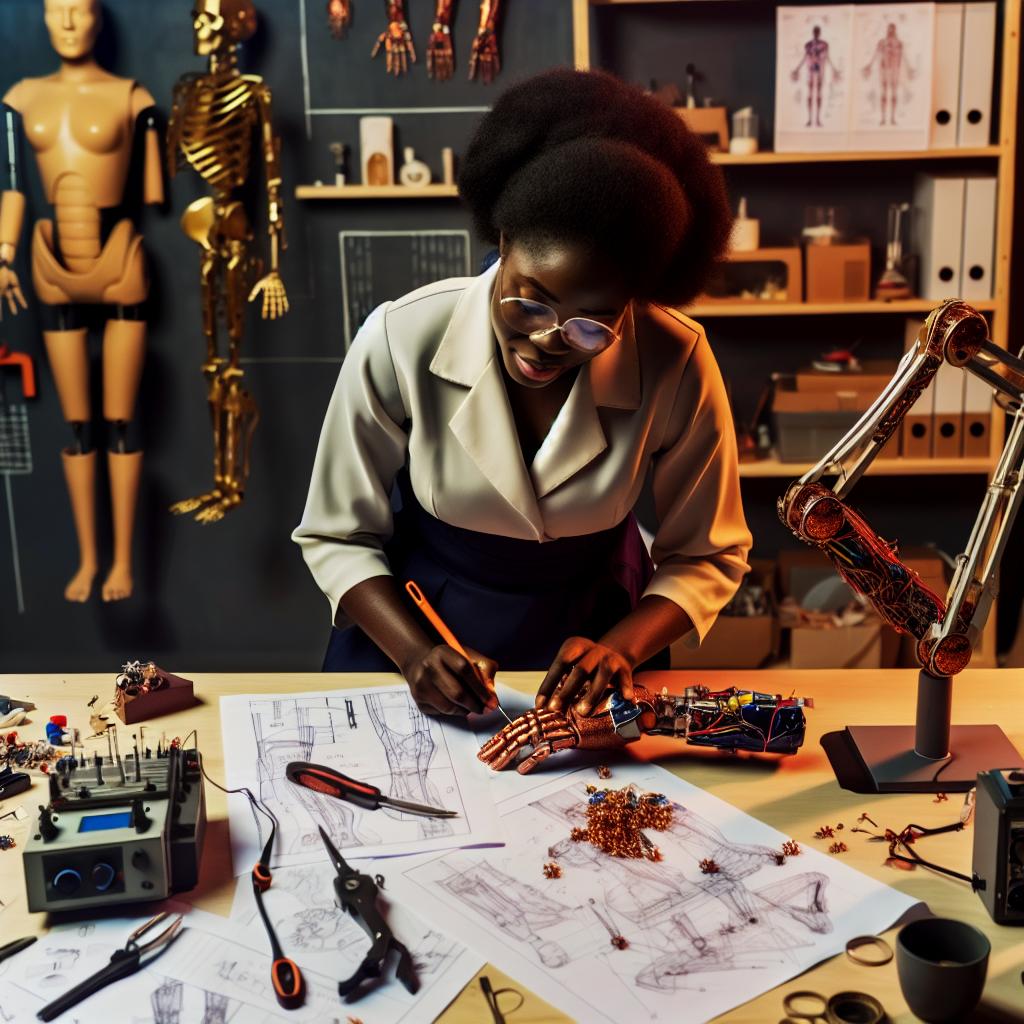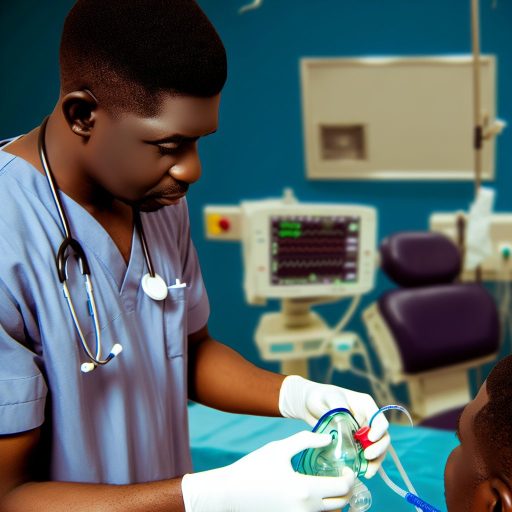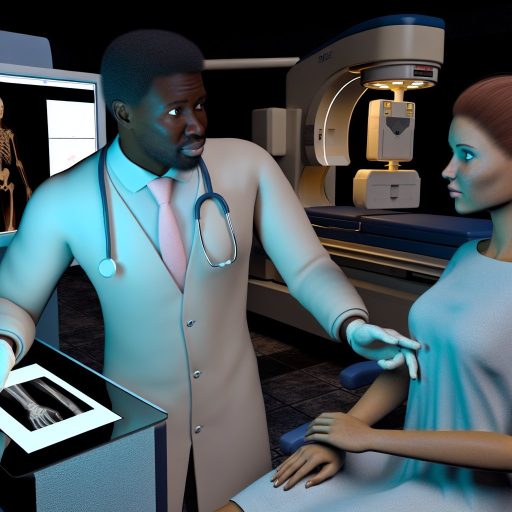Introduction:
Briefly introducing the topic of prosthesis innovations and advances in Nigeria is crucial in understanding the impact of technological advancements in prosthetics.
The field of prosthetics plays a vital role in improving the quality of life for amputees and individuals with disabilities.
Technological advances in prosthetics have revolutionized the way individuals with limb loss or limb differences can engage in daily activities and participate in society.
These advancements have greatly improved the functionality and comfort of prosthetic devices, allowing users to lead more independent and fulfilling lives.
The aim of this blog post is to delve into recent developments in prosthesis innovations and advances in Nigeria.
We will explore the groundbreaking technologies, research, and initiatives that are shaping the future of prosthetics in the country.
Overview of Prosthesis in Nigeria:
Prosthetics have been used in Nigeria for decades to improve the lives of amputees.
The current state of prosthetic technology in the country has seen significant advancements.
Amputees often face challenges in accessing quality prosthetic devices due to high costs.
Background of Prosthetics in Nigeria:
- Nigeria has a long history of using prosthetic devices to assist amputees in regaining mobility.
- Early prosthetics were basic and limited in functionality, but they served a crucial purpose.
- Over the years, technological advancements have led to more sophisticated prosthetic solutions.
Current State of Prosthetic Technology in Nigeria:
- Modern prosthetic devices in Nigeria are designed to provide better mobility and functionality.
- The use of materials such as carbon fiber has significantly improved the durability of prosthetics.
- Custom-made prosthetic limbs are now available to ensure a perfect fit for users.
Challenges Faced by Amputees in Accessing Quality Prosthetic Devices:
- High costs of prosthetic devices make them unaffordable for many amputees in Nigeria.
- Lack of insurance coverage for prosthetics further exacerbates the financial burden on amputees.
- Limited access to specialized prosthetic clinics and trained professionals in some regions of Nigeria.
Emerging Trends in Prosthesis Innovations:
Recent advancements in prosthetic technology in Nigeria have been remarkable.
The field of prosthetics has seen groundbreaking innovations that have significantly improved the quality of life for amputees in the country.
- 3D Printing Technology:
- Biomechanical Prosthetics:
- Neural-Controlled Prosthetics:
- Sustainable Solutions:
- Collaborations with International Organizations:
- Training and Capacity Building:
One of the most notable trends in prosthesis innovations is the adoption of 3D printing technology.
This cutting-edge technology allows for the customization and production of prosthetic limbs at a fraction of the cost of traditional methods.
Nigeria has also seen advancements in biomechanical prosthetics, which aim to mimic the natural movement of human limbs.
These prosthetics use advanced materials and sensors to enhance mobility and functionality for amputees.
Another emerging trend is the development of neural-controlled prosthetics that can be operated directly by the user’s brain signals.
This technology has the potential to revolutionize the way amputees interact with their prosthetic limbs.
There is a growing focus on developing sustainable and eco-friendly prosthetic solutions in Nigeria.
Researchers and innovators are exploring biodegradable materials and energy-saving technologies to reduce the environmental impact of prosthetic production.
Nigerian institutions and researchers have been actively collaborating with international organizations for technological transfer and knowledge exchange in the field of prosthetics.
These collaborations have facilitated the sharing of expertise and resources, leading to the development of cutting-edge prosthetic solutions in the country.
As part of the recent advancements in prosthesis innovations, there has been an increased focus on training and capacity building for local healthcare professionals and technicians.
This initiative aims to enhance the quality of prosthetic care and services available in Nigeria.
The emerging trends in prosthesis innovations in Nigeria showcase the country’s commitment to enhancing the quality of life for amputees through technological advancements and collaborations with international organizations.
These groundbreaking innovations are paving the way for a more inclusive and sustainable future for individuals in need of prosthetic solutions.
You Might Also Like: Preventive Dentistry: Regular Check-ups Matter
Impact of 3D Printing in Prosthetics:
3D printing has revolutionized prosthetic design and production by offering customization.
This technology enables prosthetics to be more tailored to individual needs.
3D printing has made prosthetics more affordable, especially in developing countries like Nigeria.
The role of 3D printing in prosthetics cannot be overstated as it has transformed the industry.
Benefits of 3D Printing in Prosthetics:
- Customization: 3D printing allows for personalized prosthetic solutions tailored to each patient’s unique requirements.
- Cost-Effective: By using 3D printing technology, prosthetics can be produced at a fraction of the cost of traditional methods.
- Faster Production: 3D printing enables rapid prototyping and production of prosthetics, reducing waiting times for patients.
Examples of Successful 3D Printed Prosthetic Projects in Nigeria:
- A 3D printed hand prosthesis that was customized for a young boy in Lagos, Nigeria.
- A 3D printed leg prosthesis that was developed for a cyclist who lost his leg in an accident.
- A 3D printed arm prosthesis that was designed for a veteran who lost his arm in combat.
3D printing has had a significant impact on the field of prosthetics in Nigeria.
This technology makes these devices more accessible, customizable, and cost-effective for individuals in need of such solutions.
Explore Further: Top Dental Schools in Nigeria: A Comprehensive Guide
Advantages of Artificial Intelligence in Prosthetics:
Artificial intelligence (AI) is playing a significant role in advancing prosthetic technology in Nigeria.
The utilization of AI in prosthetics has brought about numerous advantages that have positively impacted the lives of amputees and individuals with disabilities.
- Artificial intelligence enhances prosthetic functionality.
- AI-powered prosthetic limbs can adapt to user movements.
- AI has the potential to revolutionize prosthetics in Nigeria.
Below are some key advantages of incorporating artificial intelligence into prosthetic devices:
- Enhanced Functionality: AI algorithms are used to enhance the functionality of prosthetic limbs. These advanced systems can analyze data in real-time and make adjustments to ensure optimal performance based on the user’s movements.
- Adaptive Technology: AI-powered prosthetic limbs have the ability to adapt to the user’s movements. This adaptive technology allows users to perform a variety of tasks with ease, providing a more natural and intuitive user experience.
- Improved Comfort: The integration of artificial intelligence in prosthetics has led to improved comfort for users. AI algorithms can adjust the fit and alignment of prosthetic devices to ensure maximum comfort and reduce the risk of discomfort or skin irritations.
- Personalized Solutions: AI enables the development of personalized solutions for individuals with limb loss. By analyzing user data and patterns, AI-powered prosthetics can be customized to meet the specific needs and preferences of each user, enhancing overall satisfaction and usability.
- Preventative Care: Prosthetic devices powered by AI can provide preventative care by monitoring the user’s movements and detecting any abnormalities or issues in real-time. This proactive approach helps prevent potential complications and ensures long-term functionality and reliability of the prosthetic device.
- Remote Monitoring: AI technology allows for remote monitoring of prosthetic devices, enabling healthcare providers to track the user’s progress and performance without the need for frequent in-person visits. This remote monitoring capability enhances patient care and allows for timely adjustments and interventions as needed.
The integration of artificial intelligence in prosthetics offers a wide range of benefits that have the potential to significantly improve the quality of life for individuals with limb loss in Nigeria.
As AI continues to advance and evolve, we can expect to see even more innovative and transformative solutions in the field of prosthetics, ultimately enabling users to lead more independent, fulfilling, and active lives.
Learn More: Interview with a Nigerian Biomedical Technologist

Case Studies of Successful Prosthesis Innovations:
One inspiring story is that of Tunde, a young man who lost his leg in a car accident.
Transform Your Career with Expert Guidance
Get personalized mentorship consulting that’s tailored to your unique path. Our expert advice is actionable and exclusive.
Get StartedTunde was fitted with a cutting-edge prosthetic limb that allowed him to walk again.
Thanks to this innovation, Tunde regained his independence and was able to return to work.
Another success story is that of Blessing, a woman who lost her arm in a tragic accident.
- These innovations have revolutionized the lives of amputees in Nigeria.
- Amputees like Tunde and Blessing have experienced a significant improvement in their quality of life.
- They no longer feel limited by their disability and can perform daily tasks with ease.
- The advancements in prosthetic technology have truly transformed the mobility and independence of amputees.
The Impact of Prosthetic Innovations on Quality of Life:
Users of advanced prosthetic devices have expressed their gratitude for the life-changing impact.
They praise the comfort, functionality, and durability of the new prosthetic limbs.
Healthcare professionals have witnessed firsthand the positive effects of these innovations.
They attest to the effectiveness and efficiency of the new prosthetic devices in improving patient outcomes.
Explore Further: Career Opportunities in Anatomical Pathology Nigeria
Challenges and Future Directions:
Implementing advanced prosthetic technology in Nigeria faces several obstacles.
Cost is a major issue hindering widespread adoption of prosthetic innovations.
Accessibility to advanced prosthetic devices is limited in many regions of Nigeria.
Lack of awareness about the latest prosthetic solutions inhibits their acceptance.
Overcoming Challenges:
To address cost challenges, there is a need for affordable prosthetic solutions.
Government subsidies or partnerships with NGOs can help reduce the financial burden.
Donations of prosthetic devices from international organizations can also support cost-effective solutions.
Local production of prosthetic components can lower costs and improve accessibility.
Future Directions:
Increased investment in research and development for locally adaptable prosthetic technology.
Training programs for healthcare professionals on the latest prosthetic advancements.
Collaboration with international experts to bring cutting-edge prosthetic solutions to Nigeria.
Awareness campaigns to educate the public about the benefits of advanced prosthetic technology.
Significant Advancements in Prosthetic Technology
This blog post has highlighted the significant advancements in prosthetic technology in Nigeria.
The emergence of 3D printing has revolutionized the production of prosthetic limbs.
Prosthetic limbs are now more accessible and customizable for individuals.
Furthermore, the integration of sensors and artificial intelligence has enhanced the functionality and comfort of prosthetic devices.
This improvement allows users to engage in daily activities with greater ease.
It is crucial to acknowledge the importance of technological advancements in prosthetics.
These advancements have the potential to improve the quality of life for amputees and individuals with disabilities.
As we move forward, it is essential to encourage further research and collaboration among experts in the field.
This collaboration will drive innovation and push the boundaries of what is possible in prosthetic design and functionality.
By working together and embracing new technologies, we can ensure that individuals in Nigeria and around the world have access to prosthetic solutions.
These solutions will meet their needs and empower them to live full and active lives.




